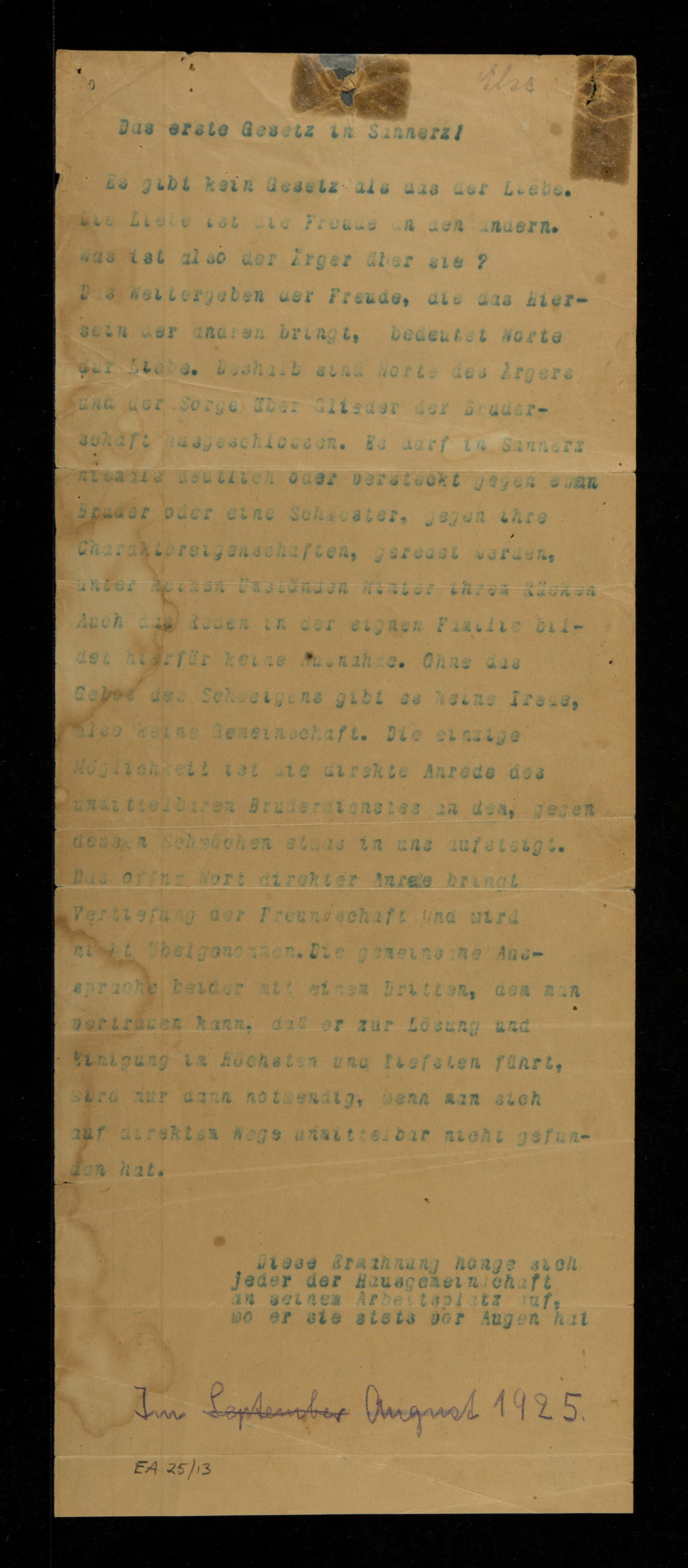This document is part of a series. Select the image(s) to download.
Manuscript
Das erste Gesetz in Sannerz (The First Law in Sannerz)
EA 25/13
| Additional Information | |
|---|---|
| Author | Eberhard Arnold |
| Date | August 01, 1925 |
| Document Id | 20126083_05_S |
The First Law in Sannerz
[Arnold, Eberhard and Emmy papers – M.S.]
EA 25/13
The First Law in Sannerz
There is no law but that of love. Love is joy in others. What then is anger at them?
Passing on the joy that the presence of the others brings us means words of love. Thus words of anger and worry about members of the brotherhood are out of the question. In Sannerz there must never be talk, either open or hidden, against a brother or a sister, against their individual characteristics-under no circumstances behind their back. Talking in one's own family is no exception to this either.
Without the commandment of silence there is no faithfulness and thus no community. The only possible way is direct address as the spontaneous brotherly service to the one whose weaknesses cause something in us to react negatively. The open word of direct address brings a deepening of friendship and it is not resented. Only when one does not find the way together immediately in this direct manner is it necessary to talk together with a third person whom one can trust to lead to a solution and uniting in the highest and deepest.
Each one in the household should hang this admonition up at his place of work where he always has it before his eyes.
Das erste Gesetz in Sannerz!
[Arnold, Eberhard and Emmy papers - M.S.]
EA 25/13
Das erste Gesetz in Sannerz!
Es gibt kein Gesetz als das der Liebe. Die Liebe ist die Freude an den anderen. Was ist also der Ärger über sie?
Das Weitergeben der Freude, die das Hiersein der anderen bringt, bedeutet Worte der Liebe. Deshalb sind Worte des Ärgers und der Sorge über Glieder der Bruderschaft ausgeschlossen. Es darf in Sannerz niemals deutlich oder versteckt gegen einen Bruder oder eine Schwester, gegen ihre Charaktereigenschaften, geredet werden, unter keinen Umständen hinter ihrem Rücken. Auch das Reden in der eignen Familie bildet hierfür keine Ausnahme. Ohne das Gebot des Schweigens gibt es keine Treue, also keine Gemeinschaft. Die einzige Möglichkeit ist die direkte Anrede des unmittelbaren Bruderdienstes an dem, gegen dessen Schwächen etwas in uns aufsteigt. Das offene Wort direkter Anrede bringt Vertiefung der Freundschaft und wird nicht übelgenommen. Die gemeinsame Aussprache beider mit einem Dritten, dem man vertrauen kann, daß er zur Lösung und Einigung im Höchsten und Tiefsten führt, wird nur dann notwendig, wenn man sich auf direktem Wege unmittelbar nicht gefunden hat.
Diese Ermahnung hänge sich jeder der Hausgemeinschaft an seinem Arbeitsplatz auf, wo er sie stets vor Augen hat.
Im September August 1925
